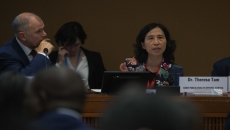With Canada's two most populous provinces poised to outline plans for a gradual return to normalcy, Prime Minister Justin Trudeau said Monday that Ottawa will help guide, but not dictate, how provinces and territories should start easing restrictions. Ontario and Quebec together account for more than 80 per cent of the country's COVID-19 cases.
Ontario Premier Doug Ford is set to present a framework for reopening the province's locked-down economy. Quebec Premier Francois Legault is to focus on schools, with economic plans expected Tuesday. Saskatchewan, Prince Edward Island and New Brunswick have already announced tentative reopening timelines.
Trudeau said provincial and territorial plans don't need Ottawa's blessing, as most measures fall outside federal jurisdiction.
"They have the responsibility to do what is right for their citizens," he said Monday.
"I have full confidence in the premiers of the provinces and the territories to move forward in a way that is right for them."
Trudeau said the federal government has been helping develop guidelines on matters such as ensuring provinces have enough medical capacity to handle a potential surge in cases and are doing enough testing.
"These will not be federal guidelines," he said. Rather, he and all 13 premiers would agree to them.
Trudeau cautioned that a complete return to normal is a long way off and governments will have to be careful until there is a vaccine for COVID-19 or treatment to make it less deadly.
"That caution will remain, because at any time, if we loosen our measures too much, we could find ourselves back in a tremendous spike."
As of mid-day Monday, there were 47,346 confirmed COVID-19 cases across Canada, including 2,617 deaths and 17,929 resolved.
Also Monday, businesses began applying for the federal government's $73-billion wage subsidy program.
Trudeau said 10,000 applications had been received by 6 a.m.
Companies that qualify will get a subsidy worth 75 per cent of each employee's wages, up to $847 a week, retroactive to mid-March.
Trudeau said money under the program is to start flowing by May 7.






